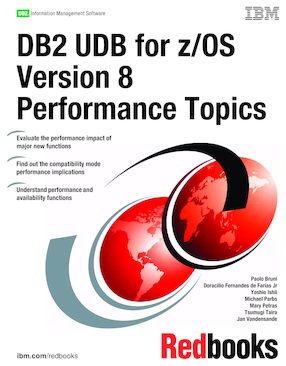DB2 UDB for z/OS Version 8 Performance Topics
An IBM Redbooks publication
Note: This is publication is now archived. For reference only.

Published on 11 April 2005, updated 01 October 2007
ISBN-10: 0738492493
ISBN-13: 9780738492490
IBM Form #: SG24-6465-00
Authors: Paolo Bruni, Doracilio Fernandes de Farias, Yoshio Ishii, Michael Parbs, Mary Petras, Tsumugi Taira and Jan Vandensande
IBM DATABASE 2 Universal Database Server for z/OS Version 8 (DB2 V8 throughout this IBM Redbooks publication) is the twelfth and largest release of DB2 for MVS. It brings synergy with the zSeries hardware and exploits the z/OS 64-bit virtual addressing capabilities. DB2 V8 offers data support, application development, and query functionality enhancements for e-business, while building upon the traditional characteristics of availability, exceptional scalability, and performance for the enterprise of choice.
Key improvements enhance scalability, application porting, security architecture, and continuous availability. Management for very large databases is made much easier, while 64-bit virtual storage support makes management simpler and improves scalability and availability. This new version breaks through many old limitations in the definition of DB2 objects, including SQL improvements, schema evolution, longer names for tables and columns, longer SQL statements, enhanced Java and Unicode support, enhanced utilities, and more log data sets.
This IBM Redbooks publication introduces the major performance and availability changes as well as the performance characteristics of many new functions. It helps you understand the performance implications of migrating to DB2 V8 with considerations based on laboratory measurements. It provides the type of information needed to start evaluating the performance impact of DB2 V8 and its capacity planning needs.
Chapter 1. DB2 UDB for z/OS Version 8
Chapter 2. Performance overview
Chapter 3. SQL performance
Chapter 4. DB2 subsystem performance
Chapter 5. Availability and capacity enhancements
Chapter 6. Utilities
Chapter 7. Networking and e-business
Chapter 8. Data sharing enhancements
Chapter 9. Installation and migration
Chapter 10. Performance tools
Appendix A. Summary of performance maintenance
Appendix B. The DBM1 storage map
Appendix C. SQL PA sample reports
Appendix D. EXPLAIN and its tables